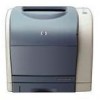HP 2500 HP PCL/PJL reference - Printer Job Language Technical Reference Manual - Page 51
Job Separation Commands 5-3, START, PASSWORD
 |
View all HP 2500 manuals
Add to My Manuals
Save this manual to your list of manuals |
Page 51 highlights
Note • NAME = "job name" - The command option NAME tags the print job with a job name. The variable job name can be any combination of printable characters and spaces or horizontal tab characters, with a maximum of 80 significant characters. The job name variable is a string and must be enclosed in double quotes, as shown in the command syntax. If the NAME option is included, the unsolicited job status includes the job name (if unsolicited job status is enabled). • START = first page - The command option START is used to provide a non-printing mode for skipping to a selected portion of the job. It indicates the first page that is printed. If the START option is omitted, the printer starts printing at the beginning of the job. If the end of the job comes before the START page, no pages are printed. For duplex jobs, the front and/or back side of the page is also printed, depending on the value of START/END. If START is an even number, the front side of that page will also be printed. If END is an odd value, the backside of that page will also be printed. This allows the selected pages to be inserted back into the original duplex job. • END = last page - The command option END indicates the page number of the last page to be printed. The last page variable is relative to page 1 of the print job. If the END variable is omitted, the printer prints to the end of the job. If the end of the job is encountered before the START page, no pages are printed. If the end of job is encountered before the END page, printing terminates. Additionally, if the START page is greater than the END page, no pages are printed. • PASSWORD = number - The command option PASSWORD allows the application to modify the NVRAM variables if the password matches the active password variable. (Using PJL, the NVRAM variables are modified using either the DEFAULT or INITIALIZE commands; some printer language commands may also modify NVRAM variables.) Passwords are set using the DEFAULT command. The default password value is 0, which indicates PJL security is disabled-any job can modify printer feature settings using the DEFAULT or INITIALIZE commands. If any other password value is active, PJL jobs must issue the correct password value or they are disabled from using the DEFAULT or INITIALIZE commands. (See the "PJL Job Security" section at the end of this chapter.) EN Job Separation Commands 5-3















